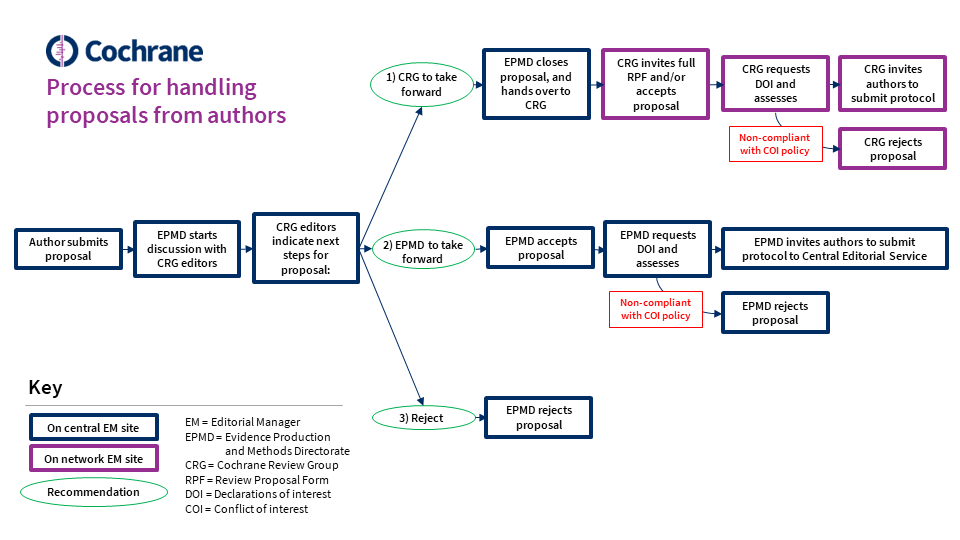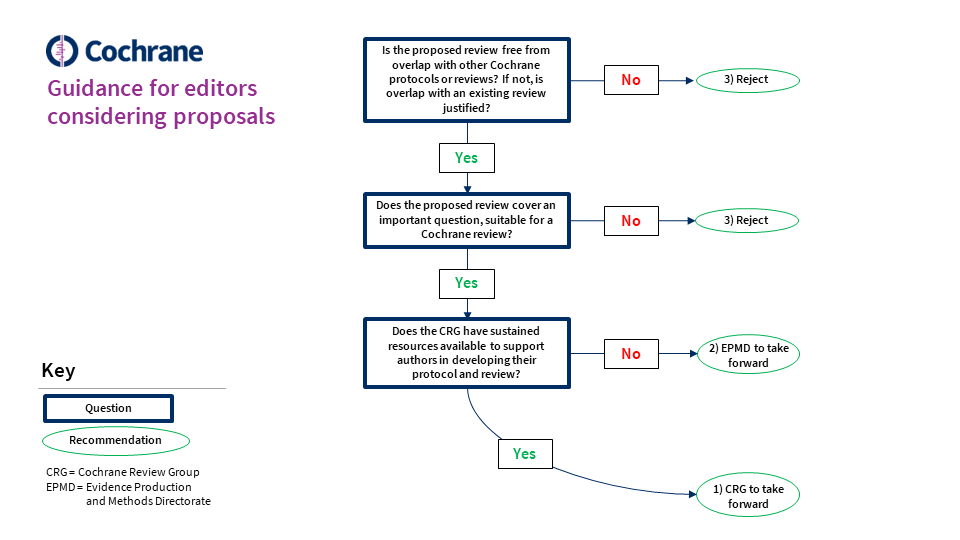The processes described on this page are in effect from 24 June 2022. |

Process for editors handling review proposals
Fig. 1. Summary of process for handling proposals from authors to conduct new Cochrane Reviews

Initial process
- Authors submit a proposal to conduct a new Cochrane Review to the central Editorial Manager site.
- A member of the Evidence Production and Methods Directorate (EPMD) initiates a ‘Discussion’ on the central Editorial Manager site, inviting members from the relevant CRG to begin a conversation about the proposal.
- The CRG’s Co-ordinating Editor, Managing Editor, Assistant Managing Editor, Information Specialist, and any other editors nominated by the CRG can be involved in discussions. To nominate additional members from a CRG to be involved in proposal discussions, please email support@cochrane.org with the person’s details (name, email address, affiliated CRG), specifying whether the person will be involved in assessing proposals covering specific topics only, and the names/keywords for the topics they will consider.
- Participants in the discussion will be asked in Editorial Manager to choose one of the following options for the proposal, and will be provided with a link to the guidance on making their choice:
- CRG to take the proposal forward
- EPMD to take the proposal forward
- Reject the proposal
- For options 1 and 2, the CRG editors will be asked to comment on whether they think the proposed article could be a high-profile or controversial review. In these cases, EPMD will liaise with the Cochrane Methods & Evidence Synthesis Development team and the Cochrane communications team about potential support for authors.
- Depending on which option is selected, the subsequent processes will differ.
Further process according to option selected
1. CRG to take forward
- EPMD closes the proposal on the central Editorial Manager site and informs the authors by email (copying in the CRG editors and attaching the full proposal) that the CRG will contact them about their proposal.
- Once the CRG receives the email from EPMD to authors, the CRG either:
- invites the authors to submit a full Review Proposal Form (RPF) to their network Editorial Manager site and assesses the RPF as usual; or
- generates and accepts the proposal without an RPF on their network Editorial Manager site.
- Accepting the proposal generates a protocol in RevMan, 'registered' with the CRG.
- The CRG requests that authors submit their declarations of interest forms via Editorial Manager. On submission of the forms, the CRG assesses whether the author team is in compliance with the Conflict of Interest (CoI) Policy for Cochrane Library Content.
- If the author team is not in compliance, the ME rejects the proposal and emails the authors informing them of the rejection.
- The CRG then invites the authors to submit the protocol to their network Editorial Manager site.
2. EPMD to take forward
- EPMD ensures the section category in Editorial Manager is 'EPMD' and accepts the proposal.
- Accepting the proposal generates a protocol in RevMan, ‘registered’ with EPMD.
- EPMD requests that the authors submit their declarations of interest forms via Editorial Manager. On submission of the forms, EPMD assesses whether the author team is in compliance with the Conflict of Interest (CoI) Policy for Cochrane Library Content.
- If the author team is not in compliance, EPMD rejects the proposal and emails the authors informing them of the rejection.
- If the author team is in compliance, EPMD then informs the authors how to submit their protocol to the Central Editorial Service.
3. Reject the proposal
- EPMD informs the authors that their proposal has been rejected.
Guidance for editors considering proposals
Fig. 2. Summary of guidance for editors when considering proposals from authors to conduct new Cochrane Reviews.

Background
When CRG editors are invited to a proposal ‘Discussion’ on the central Editorial Manager site, they are asked to select one of the following options, with brief rationale:
- CRG to take forward
- EPMD to take forward
- Reject the proposal
What to consider
Please consider the following factors when determining which option to select:
Is the proposed review free from overlap with other Cochrane Reviews or protocols? If not, is overlap with an existing review justified?
If the proposal overlaps with existing content, and a new review in the same topic area is not justified (e.g. it won’t add to what is already available on the Cochrane Library), the proposal should be rejected.
Authors may indicate that overlap with existing content is justified, for example, if the review will include a newly available intervention or address a more contemporary question. In these cases, it is at the discretion of the editors to decide whether the overlap is justified. If editors consider the overlap to be justified, they should include brief details about the overlap and rationale in the discussion reply.
Does the proposed review cover an important question, suitable for a Cochrane Review?
Editors may determine that a proposal is not of importance to the Cochrane Library’s audience, or that the question does not lend itself to being answered by a systematic review. In these cases, the proposal should be rejected.
If the proposal covers an important question, or the importance of the question is not yet fully clear, the proposal should be taken forward. Editors can assess the question’s importance further by requesting the authors submit a Review Proposal Form and/or a completed protocol. Using a completed protocol to assess the question’s importance allows authors to access Cochrane tools (including RevMan) and Cochrane resources.
If on submission and full assessment of the protocol, editors deem the topic is of insufficient importance for a Cochrane Review, the methods are not appropriate for the question, or the protocol is otherwise of low quality, the protocol will be rejected.
Does the CRG have sustained resources available to support authors in developing their protocol and review?
Some CRGs have sustained funding and are able to support authors in developing and writing their protocol and review, whereas other CRGs do not. CRGs with sustained funding can choose to take the proposal forward to an RPF, or proceed without an RPF and invite the protocol. CRGs without sustained funding can select for EPMD to take the proposal forward, and for the protocol to be submitted to the Central Editorial Service.
Preparing for high-profile or controversial reviews
If CRG editors recommend taking forward the proposal, with either the CRG or EPMD, they will also be asked if they think the proposed article could be a high-profile or controversial review. Author teams of high-profile reviews may qualify for centralized support during the development of the protocol and review (for example, assistance in writing or running searches, assessment of analysis and GRADE ratings prior to write-up, dedicated author support with author queries before submission). In addition, EPMD will alert Cochrane’s central communications team to the initiation of a high-profile review, to help to the team plan for knowledge translation activities. Authors of controversial reviews may also be offered support in handling engagement on their review.

